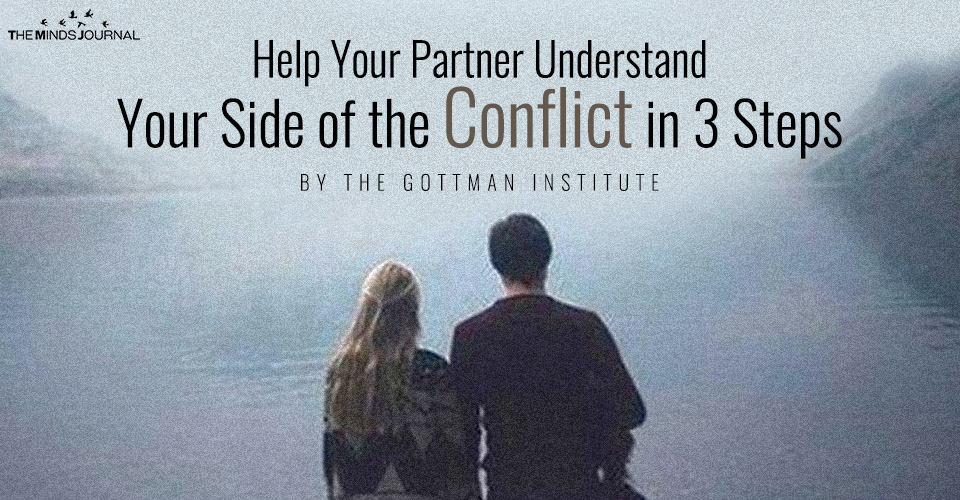This is how you can help your partner to understand your side of conflict.
There’s no way around it: being misunderstood sucks. It can make you feel frustrated, upset, and hopeless. It can feel even worse in times of conflict.
Conflict isn’t easy. There’s hurt. There’s misunderstanding. And, at the same time, there are parts of us that are screaming to feel validated and understood.
The problem for many of us is we have learned to communicate in a way that actually pushes our partners away from truly understanding us or meeting our needs. It’s common to see criticism or contempt in a relationship where partners feel disconnected and misunderstood.
Ultimately, conflict is created by a lack of attunement. This is because one of our deepest needs is for others to understand, or attune to, us. This desire to be “seen” starts when we are young. Take kids, for example: when they play hide-and-seek, they love to be found.
As adults, we crave to be seen in our rawness. To courageously allow another into our inner emotional world. This is why Brene Brown links vulnerability with wholehearted living because vulnerability allows us to be truly known by another. She also refers to vulnerability as the glue that holds relationships together.
But being vulnerable is no easy task. It’s much easier to blame or attack our partners for the problems in our relationship, rather than express how we are feeling.
For example, say your partner leaves the room when you get into an argument. Your gut response may be to blame and yell, “You’re a coward for leaving the room when we fight!” But if you took the more courageous, vulnerable route, you might instead say, “I feel scared and inadequate when you leave the room during our fight. My fear is that I’m not good enough for you to fight for. Is there a way I can bring up a conflict so you and I can work through it together?”
Can you see how easy it is to hide compared to how courageous it is to be vulnerable and seen?
When you speak in a gentle, open way that allows your partner to attune to you, you help them to understand why you feel the way you do.
As a result, you feel more emotionally connected, which builds trust, increases intimacy, and makes sex oh so much better. Not to mention that when your partner understands your perspective, they are more willing to meet your needs as well as their own.
So how can you get your partner to attune to you during the conflict?
Over the next six weeks, we are going to teach you the skills to attune to each other during your weekly, hour-long State of the Union conversation.
The first skill of attunement for the speaker is the “A” in A.T.T.U.N.E., and it stands for Awareness.
Speak with awareness
By speaking with awareness, we mean that the speaker chooses words mindfully and avoids making the listening partner feel cornered or defensive. This then helps the listening partner open up to understanding because they are not under attack.
Here are three ways you can speak with more awareness:
1. Use “I” statements
An “I” statement reflects your feelings, perceptions, and experiences. Using the word “you” during the conflict has the opposite effect: it points fingers at your partner’s feelings, behavior, or personality.
And as the saying goes, whenever you point your finger at someone, there are three fingers pointing back to you.
During a session, a client of mine I’ll call Tristan said to his partner, “You are so self-centered. You clearly didn’t think about how uncomfortable I felt sitting at Canlis (a fancy restaurant) all alone!”
His partner instantly became defensive. “No, I’m not! I had to stay late to finish up the proposal for the meeting tomorrow so we can take our trip this weekend.”
When we paused and tried the discussion again—this time focusing on using “I” statements—Tristan’s tone changed completely. “I wish you had shown up to the restaurant on time,” he said. “I felt like a loser sitting there waiting for you next to the other couples sitting around our table. I even had a little kid staring at me like I was weird. I felt really lonely…”
This softer approach allowed his partner to relate to where he was coming from and find common ground. Her response? “It sucks to sit alone in a restaurant. I know that feeling. I’m sorry. I’ll make sure to be more mindful of the time.”
Read There Are Two Views to Every Conflict and Both Are Valid
2. Focus on one issue
Since you have your partner’s undivided attention during your State of the Union conversation, it can be very tempting to lay out all of your relationship problems at once.
But the more problems you try to air, the less likely they are to be solved. Instead, focus on one event and describe it like a journalist:
- “I would like you to take out the trash without me having to ask you to do it.”
- “I feel frustrated when you come home later than you say you will without checking in with me.”
3. Protect your partner’s triggers
In Stan Tatkin’s audio program Your Brain on Love, he states 11 facts about people in relationships. The seventh is “Romantic Partners are Responsible for Each Other’s Past.”
Whether we like it or not, we are affected by the raw spots in our partner’s past, just as they are affected by ours.
These raw spots can escalate conflict if they are not cared for. Your partner’s baggage may be a source of irritation, but it’s unrealistic to expect them to drop their pain points and “change.” Instead, you can prevent conflict from worsening by working around their triggers with compassion.
Intimately knowing your partner gives you the superpower to love them compassionately despite their raw spots, or to severely hurt them with the knowledge you have. The latter breaks relationships, while the former builds them.
Next week, we will teach you the next letter T, which stands for Tolerance of your partner’s perspective.
How you talk to your partner about issues in your relationship determines how effectively the relationship problems are resolved.
If you want to change your partner’s behavior towards you, start by changing your behavior towards them.
Read Conflict Is A Normal And Natural Part Of Your “Happily Ever After”
Written By Kyle Benson










Leave a Reply